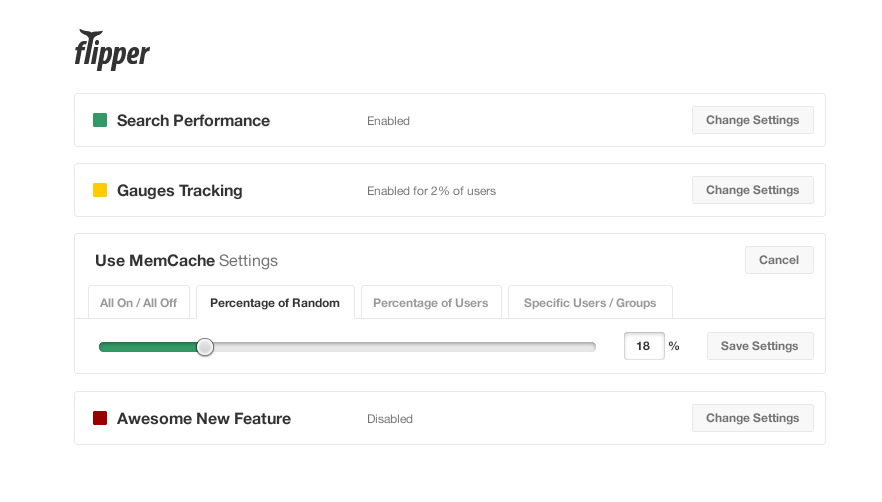Website | Documentation | Examples | Chat | Twitter | Ruby.social
Beautiful, performant feature flags for Ruby and Rails.
Flipper gives you control over who has access to features in your app.
- Enable or disable features for everyone, specific actors, groups of actors, a percentage of actors, or a percentage of time.
- Configure your feature flags from the console or a web UI.
- Regardless of what data store you are using, Flipper can performantly store your feature flags.
- Use Flipper Cloud to cascade features from multiple environments, share settings with your team, control permissions, keep an audit history, and rollback.
Control your software — don't let it control you.
Add this line to your application's Gemfile:
gem 'flipper'
You'll also want to pick a storage adapter, for example:
gem 'flipper-active_record'
And then execute:
$ bundle
Or install it yourself with:
$ gem install flipper
💌 Subscribe - we'll send you short and sweet emails when we release new versions (examples).
Use Flipper#enabled? in your app to check if a feature is enabled.
# check if search is enabled
if Flipper.enabled?(:search, current_user)
puts 'Search away!'
else
puts 'No search for you!'
endAll features are disabled by default, so you'll need to explicitly enable them.
# Enable a feature for everyone
Flipper.enable :search
# Enable a feature for a specific actor
Flipper.enable_actor :search, current_user
# Enable a feature for a group of actors
Flipper.enable_group :search, :admin
# Enable a feature for a percentage of actors
Flipper.enable_percentage_of_actors :search, 2Read more about getting started with Flipper and enabling features.
Like Flipper and want more? Check out Flipper Cloud, which comes with:
- multiple environments — production, staging, per continent, whatever you need. Every environment inherits from production by default and every project comes with a project overview page that shows each feature and its status in each environment.
- personal environments — everyone on your team gets a personal environment (that inherits from production) which they can modify however they want without stepping on anyone else's toes.
- permissions — grant access to everyone in your organization or lockdown each project to particular people. You can even limit access to a particular environment (like production) to specific people.
- audit history — every feature change and who made it.
- rollbacks — enable or disable a feature accidentally? No problem. You can roll back to any point in the audit history with a single click.
- maintenance — we'll keep the lights on for you. We also have handy webhooks and background polling for keeping your app in sync with Cloud, so our availability won't affect yours. All your feature flag reads are local to your app.
- everything in one place — no need to bounce around from different application UIs or IRB consoles.
Cloud is super simple to integrate with Rails (demo app), Sinatra or any other framework.
We also have a free plan that you can use forever.
- Fork it
- Create your feature branch (
git checkout -b my-new-feature) - Run the tests (
bundle exec rake). Check out Docker-Compose if you need help getting all the adapters running. - Commit your changes (
git commit -am 'Added some feature') - Push to the branch (
git push origin my-new-feature) - Create new Pull Request
- Update the version to be whatever it should be and commit.
script/release- Create a new GitHub Release
| pic | @mention | area |
|---|---|---|
| @jnunemaker | most things | |
| @bkeepers | most things | |
| @dpep | tbd | |
| @alexwheeler | api | |
| @thetimbanks | ui | |
| @lazebny | docker | |
| @pagertree | sponsor | |
| @kdaigle | sponsor |






